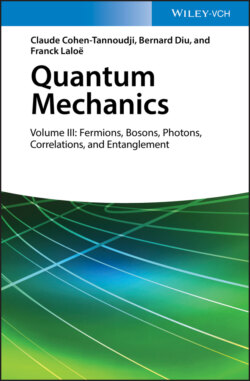Читать книгу Quantum Mechanics, Volume 3 - Claude Cohen-Tannoudji - Страница 152
Complement GXV Fermions or Bosons: Mean field thermal equilibrium
Оглавление1 1 Variational principle 1-a Notation, statement of the problem 1-b A useful inequality 1-c Minimization of the thermodynamic potential
2 2 Approximation for the equilibrium density operator …. 2-a Trial density operators 2-b Partition function, distributions 2-c Variational grand potential 2-d Optimization
3 3 Temperature dependent mean field equations 3-a Form of the equations 3-b Properties and limits of the equations 3-c Differences with the zero-temperature Hartree-Fock equations (fermions) 3-d Zero-temperature limit (fermions) 3-e Wave function equations
Understanding the thermal equilibrium of a system of interacting identical particles is important for many physical problems: conductor or semiconductor electronic properties, liquid Helium or ultra-cold gas properties, etc. It is also essential for studying phase transitions, various and multiple examples of which occur in solid and liquid physics: spontaneous magnetism appearing below a certain temperature, changes in electrical conduction, and many others. However, even if the Hamiltonian of a system of identical particles is known, calculation of the equilibrium properties cannot, in general, be carried to completion: these calculations present real difficulties in the handling of state vectors and interaction operators, where non-trivial combinations of creation and annihilation operators occur. One must therefore use one or several approximations. The most common one is probably the mean field approximation, which, as we saw in Complement EXV, is the base of the Hartree-Fock method. In that complement, we showed, in terms of state vectors, how this method could be used to obtain approximate values for the energy levels of a system of interacting particles. As we consider here the more complex problem of thermal equilibrium, which must be treated in terms of density operators, we show how the Hartree-Fock method can be extended to this more general case.
We are going to see that, thanks to this approach, one can obtain compact formulas for an approximate value of the density operator at thermal equilibrium, in the framework of the grand canonical ensemble. The equations to be solved are fairly similar1 to those of Complement EXV. The Hartree-Fock method also gives a value of the thermodynamic grand potential, which leads directly to the pressure of the system. The other thermodynamic quantities can then be obtained via partial derivatives with respect to the equilibrium parameters (volume, temperature, chemical potential, eventually external applied field, etc. – see Appendix VI). It is clearly a powerful method even though it still is an approximation as the particles interactions are treated via a mean field approach where certain correlations are not taken into account. Furthermore, for bosons, it can only be applied to physical systems far from Bose-Einstein condensation; the reasons for this limitation will be discussed in detail in § 4-a of Complement HXV.
Once we have recalled the notation and a few generalities, we shall establish (§ 1) a variational principle that applies to any density operator. It will allow us to search in any family of operators for the one closest to the density operator at thermal equilibrium. We will then introduce (§ 2) a family of trial density operators whose form reflects the mean field approximation; the variational principle will help us determine the optimal operator. We shall obtain Hartree-Fock equations for a non-zero temperature, and study some of their properties in the last section (§ 3). Several applications of these equations will be presented in Complement HXV.
The general idea and the structure of the computations will be the same as in Complement EXV, and we keep the same notation: we establish a variational condition, choose a trial family, and then optimize the system description within this family. This is why, although the present complement is self-contained, it might be useful to first read Complement EXV.
